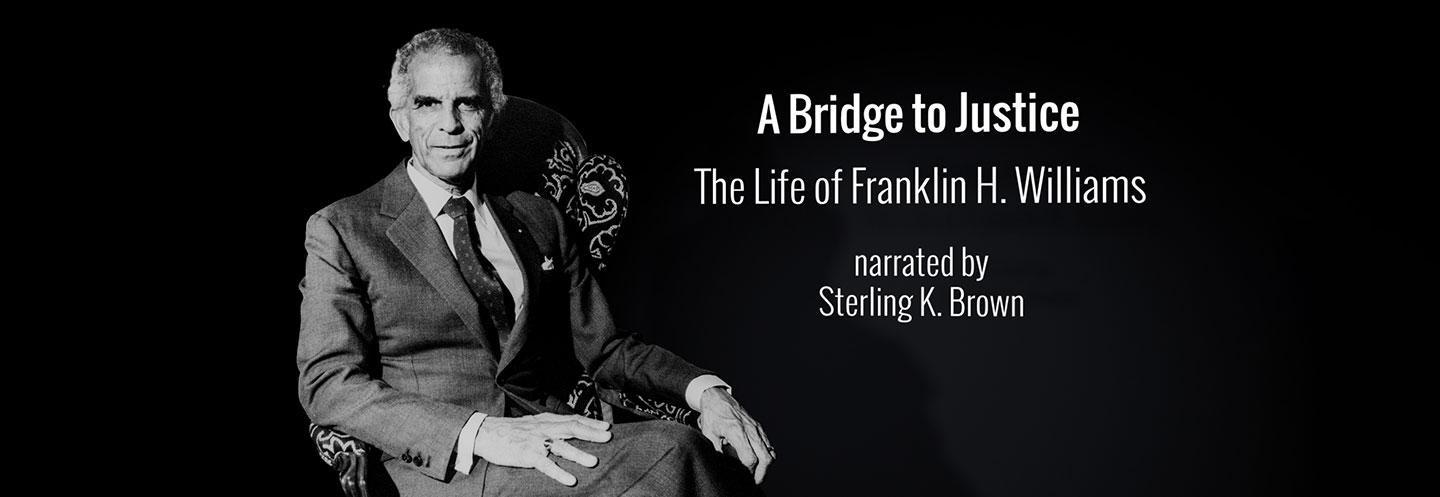
A Bridge to Justice: The Life of Franklin H. Williams
Civil rights leader, lawyer, diplomat, organizer of the Peace Corps and its first African-American director, United Nations representative, president of the Phelps-Stokes Fund, associate of Thurgood Marshall and first chair of a unique judicial commission dedicated to racial fairness, Franklin Hall Williams was a visionary and trailblazer who devoted his life to the pursuit of civil rights—not through acrimony and violence and hatred, but through reason and example. Recent events in our nation’s history and the troubling resurgence of the white supremacy movement make painfully clear that the battle for civil rights is not one that has been fought and won, but rather one that demands eternal vigilance. Franklin Williams’ inspiring life story and his impact on the civil rights movement and on the court system is a story that simply must be told and must be remembered by those to whom he handed the baton of freedom and equality.
Curriculum Resources
Using clips from the documentary, A Bridge to Justice: The Life of Franklin H. Williams, Buffalo Toronto Public Media has developed 3 lesson plans to be used in a classroom setting. Videos and accompanying resources are appropriate for use with grade 7 - 12 students. Topics of the activities and discussions include the importance of civic engagement and the courts - including jury service, the impact of the court system on the preservation of civil rights and civil liberties, racism, civil rights advocacy, the Judicial Branch and Judicial Independence. Activities are aligned to the New York State K-12 Social Studies Framework, as well as the National Curriculum Standards for Social Studies. Some of the themes addressed are Culture; Time, Continuity, and Change; Individual Development and Cultural Identity; Power, Authority and Governance; Civic Ideals and Practices; and the Development and Transformation of Social Structures.
Lesson plans are also available to schools nationwide, and available for download, on PBS LearningMedia (pbslearningmedia.org). PBS LearningMedia has a national reach of 1.8 million educators, over 30 million students and a digital library of more than 118,000 classroom-ready resources. The free, online platform provides digital learning tools for preschool teachers and K-12 classrooms.
Lesson Plans
Walking the Bridge to Equity
In this lesson, students will learn about Franklin H. Williams and the New York State Judicial Commission on Minorities and why it was formed. Students will read the introduction to the report that the Commission produced and then work together in groups to do their own research on inequities around them. Students will be able to recognize the many, and varied paths, to combating the lack of diversity anywhere and examine different techniques used to enact change.
Facing Adversity
In this lesson, students will discuss the meaning of adversity and be asked to think about someone historically, like Franklin H. Williams, or a contemporary who has faced adversity. Students will do research and possibly interview someone who has a story of facing adversity. Students will be able to think critically and historically on examples of civil rights leaders and their practices and practice interview style communications and journalistic writing.
Without Fear or Favor
In this lesson, students will learn about, and discuss judicial independence. They will be asked to write a 1-2 page essay on judicial independence, that includes Franklin Williams and/or real-world examples. Students will be able to show understanding of the term “judicial independence” and explain how the Franklin H. Williams Commission contributes to judicial independence.
Community and Educator Discussion Guide
An easy to use resource for community members and high school classrooms, the discussion guide includes suggested discussion questions, tips for community or school screenings, and outlines how to use A Bridge to Justice: The Life of Franklin H. Williams to conduct meaningful conversations.
"A Bridge to Justice: The Life of Franklin H. Williams" Discussion Guide
The documentary, “A Bridge to Justice: The Life of Franklin H. Williams,” and the discussion guide can be valuable tools to educate students and community members about the importance of Franklin Williams and his objectives. There are many themes featured in the documentary that can be used to initiate meaningful discussions about this important aspect of U.S. history. Some of the themes that can be explored are the importance of civic engagement and the courts - including jury service, the impact of the court system on the preservation of civil rights and civil liberties, racism, civil rights advocacy, the importance of diversity, and the Judicial Branch and Judicial Independence. Discussion questions and video can play a supporting role in understanding what role Franklin H. Williams played in the civil rights movement and the New York State Judicial System as we know it today.
In addition to accessing the A Bridge to Justice: The Life of Franklin H. Williams content through PBS LearningMedia and wned.org, videos and activities are on a limited number of flashdrives for distribution to targeted schools and libraries in Western New York and beyond. If you'd like to request a free A Bridge to Justice: The Life of Franklin H. Williams flashdrive, please contact Beth Fronckowiak at bfronckowiak@wned.org.
Watch
A documentary on civil rights leader, lawyer and Peace Corps organizer Franklin Williams.